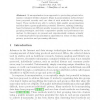Free Online Productivity Tools
i2Speak
i2Symbol
i2OCR
iTex2Img
iWeb2Print
iWeb2Shot
i2Type
iPdf2Split
iPdf2Merge
i2Bopomofo
i2Arabic
i2Style
i2Image
i2PDF
iLatex2Rtf
Sci2ools
DEXA
2007
Springer
2007
Springer
Clustering-Based K-Anonymisation Algorithms
Abstract. K-anonymisation is an approach to protecting private information contained within a dataset. Many k-anonymisation methods have been proposed recently and one class of such methods are clusteringbased. These methods are able to achieve high quality anonymisations and thus have a great application potential. However, existing clusteringbased techniques use different quality measures and employ different data grouping strategies, and their comparative quality and performance are unclear. In this paper, we present and experimentally evaluate a family of clustering-based k-anonymisation algorithms in terms of data utility, privacy protection and processing efficiency.
Related Content
| Added | 07 Jun 2010 |
| Updated | 07 Jun 2010 |
| Type | Conference |
| Year | 2007 |
| Where | DEXA |
| Authors | Grigorios Loukides, Jianhua Shao |
Comments (0)

